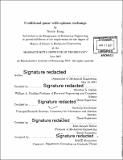| dc.contributor.advisor | Munther A. Dahleh, Mardavij Roozbehani, and Jean-Jacques Slotine. | en_US |
| dc.contributor.author | Jiang, Bomin | en_US |
| dc.contributor.other | Massachusetts Institute of Technology. Department of Mechanical Engineering. | en_US |
| dc.date.accessioned | 2017-10-04T15:07:05Z | |
| dc.date.available | 2017-10-04T15:07:05Z | |
| dc.date.copyright | 2017 | en_US |
| dc.date.issued | 2017 | en_US |
| dc.identifier.uri | http://hdl.handle.net/1721.1/111756 | |
| dc.description | Thesis: S.M., Massachusetts Institute of Technology, Department of Mechanical Engineering, 2017. | en_US |
| dc.description | Cataloged from PDF version of thesis. | en_US |
| dc.description | Includes bibliographical references (pages 53-54). | en_US |
| dc.description.abstract | Traditional coalitional game theory does not apply if different participants hold different opinions about the payoff function that corresponds to each subset of the coalition. In this thesis, we propose a framework in which players can exchange opinions about their views of payoff functions and then decide the distribution of the value of the grand coalition. The main contributions of this thesis include: 1. This thesis proposes a coalitional game model with private payoff functions and opinion exchange. In current literature, no information exchange on private payoff functions has been considered. 2. When players are truth-telling, the problem of opinion consensus is decoupled from the coalitional game. However, interesting dynamics arise when players are strategic in the consensus phase. Assuming that all players are rational, we show that, if influential players are risk-averse, an efficient fusion of the distributed data is achieved at pure strategy Nash equilibrium, meaning that the average opinion will not drift as time goes on. 3. If the weighted average of private payoff functions is super-modular, then there exists a risk averse level such that the Bayesian core is non-empty. 4. Without the assumption that all players are rational, each player can use an algorithmic R-learning process, which gives the same result as the pure strategy Nash equilibrium with rational players. | en_US |
| dc.description.statementofresponsibility | by Bomin Jiang. | en_US |
| dc.format.extent | 54 pages | en_US |
| dc.language.iso | eng | en_US |
| dc.publisher | Massachusetts Institute of Technology | en_US |
| dc.rights | MIT theses are protected by copyright. They may be viewed, downloaded, or printed from this source but further reproduction or distribution in any format is prohibited without written permission. | en_US |
| dc.rights.uri | http://dspace.mit.edu/handle/1721.1/7582 | en_US |
| dc.subject | Mechanical Engineering. | en_US |
| dc.title | Coalitional game with opinion exchange | en_US |
| dc.type | Thesis | en_US |
| dc.description.degree | S.M. | en_US |
| dc.contributor.department | Massachusetts Institute of Technology. Department of Mechanical Engineering | |
| dc.identifier.oclc | 1004565439 | en_US |
